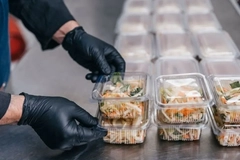Nigeria installs bottle and can return scheme to boost recycling and citizen participation
Nigeria is installing reverse vending machines (RVMs) to accelerate waste management and circularity. The initiative, beginning in the capital Abuja, is led by a local woman-owned technology start-up, which will collect data to inform further waste management development throughout the country.
The RVMs will be installed in 25 key locations within Abuja, Federal Capital Territory. The UN Industrial Development Organization (UNIDO) facilitated the initiative in collaboration with the Abuja Environmental Protection Board (AEPB).
The undertaking supports Nigeria’s efforts to reduce plastic waste, improve collection systems with digital technology, increase recycling and support the country’s transition to a circular economy.
While Nigeria has well-set policies and regulations regarding waste management and plastics, including EPR, “the implementation is up to governments, where capacity may not be sufficient,” a UNIDO spokesperson tells Packaging Insights.
The initiative is supported by UNIDO’s Project “Promoting sustainable plastic value chains through circular economy practices,” funded by the Government of Japan.
The 25 RVMs will collect approximately 540 metric tons of PET bottles annually and serve as a model for future improvements of the plastic collection system.
 The machines aim to empower community engagement, offering an accessible way for recycling.Citizen engagement
The machines aim to empower community engagement, offering an accessible way for recycling.Citizen engagement
Ecobarter, a Nigerian woman-owned integrated digital technology waste start-up, produces the RVMs.
The machines will empower local communities to actively manage waste, offering an easy and accessible way for residents or consumers to contribute to recycling.
“Within the public-private partnership arrangement, consumer awareness and education on how to use the RVM and its benefits will be led by Ecobarter. AEPB and UNIDO will also continue organizing outreach activities,” says the spokesperson.
Placing the RVMs in high-traffic areas in Abuja will allow citizens to deposit empty plastic bottles and aluminum cans in exchange for incentives, encouraging active public participation in recycling efforts.
According to the World Bank, Nigeria produces over 4.7 million tons of plastic waste annually, of which 20% is produced within 30 km of the coast.
The cost of damage caused by plastic waste in West African countries is currently estimated to be up to US$33,000 per ton.
Data collection for further expansion
The digitally collected data from the pilot will inform future waste management strategies in Abuja and could lead to technology expansion across other cities in Nigeria, leading to a nationwide expansion of the RVM program.
“Like many other countries in the region, most recycling activities and collections [in Nigeria] are led by the private sector. This RVM arrangement is also an outcome of a public-private partnership. The owner of RVM is AEPB, and the machine will be managed by Ecobarter, which includes collecting bailed material from the machine and maintaining it,” says the spokesperson.
“It [RVMs] will improve collection rates. While 25 locations are not enough, UNIDO hopes that AEPB continues to expand the locations further with their own fund.”












